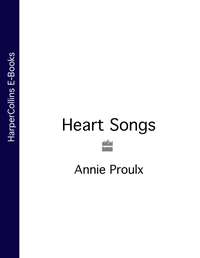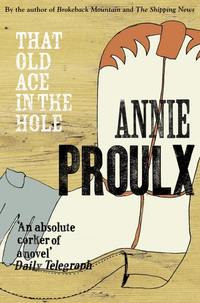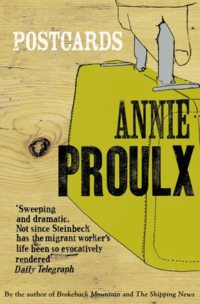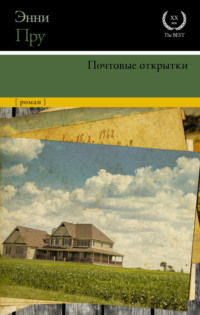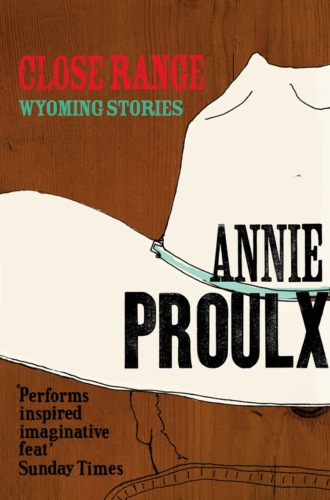
Полная версия
Close Range: Brokeback Mountain and other stories

ANNIE PROULX
Close Range:Brokeback Mountain and Other Stories

Copyright
Fourth Estate
An imprint of HarperCollins Publishers 1 London Bridge Street, London SE1 9GF
www.4thestate.co.uk
This edition published 2010
First published in Great Britain as Close Range: Wyoming Stories by Fourth Estate in 1999
Copyright © Dead Line, Ltd. 1999
‘Brokeback Mountain’, ‘The Mud Below’, ‘The Blood Bay’ and ‘The Bunchgrass Edge of the World’ originally appeared in The New Yorker; ‘The Half-Skinned Steer’ appeared in The Atlantic; ‘People in Hell Just Want a Drink of Water’ appeared in GQ.
Annie Proulx asserts the moral right to be identified as the author of this work
A catalogue record for this book is available from the British Library
This novel is entirely a work of fiction. The names, characters and incidents portrayed in it are the work of the author’s imagination. Any resemblance to actual persons, living or dead, events or localities is entirely coincidental.
All rights reserved under International and Pan-American Copyright Conventions. By payment of the required fees, you have been granted the nonexclusive, nontransferable right to access and read the text of this ebook on screen. No part of this text may be reproduced, transmitted, downloaded, decompiled, reverse engineered, or stored in or introduced into any information storage and retrieval system, in any form or by any means, whether electronic or mechanical, now known or hereinafter invented, without the express written permission of HarperCollins e-books.
Ebook Edition © MAY 2012 ISBN 9780007368815
Version 2016-06-13
HarperCollinsPublishers has made every reasonable effort to ensure that any picture content and written content in this ebook has been included or removed in accordance with the contractual and technological constraints in operation at the time of publication.
Dedication
These stories are for my children
Muffy
Jon
Gillis
Morgan
Epigraph
“Reality’s never been of much use out here.”
—Retired Wyoming rancher
Contents
Cover
Title Page
Copyright
Dedication
Epigraph
The Half-Skinned Steer
The Mud Below
Job History
The Blood Bay
People in Hell Just Want a Drink of Water
The Bunchgrass Edge of the World
Pair a Spurs
A Lonely Coast
The Governors of Wyoming
55 Miles to the Gas Pump
Brokeback Mountain
Acknowledgements
About the Author
Also by Annie Proulx
Praise
About the Publisher
The Half-Skinned Steer
IN THE LONG UNFURLING OF HIS LIFE, FROM TIGHT-wound kid hustler in a wool suit riding the train out of Cheyenne to geriatric limper in this spooled-out year, Mero had kicked down thoughts of the place where he began, a so-called ranch on strange ground at the south hinge of the Big Horns. He’d got himself out of there in 1936, had gone to a war and come back, married and married again (and again), made money in boilers and air-duct cleaning and smart investments, retired, got into local politics and out again without scandal, never circled back to see the old man and Rollo bankrupt and ruined because he knew they were.
They called it a ranch and it had been, but one day the old man said it was impossible to run cows in such tough country where they fell off cliffs, disappeared into sinkholes, gave up large numbers of calves to marauding lions, where hay couldn’t grow but leafy spurge and Canada thistle throve, and the wind packed enough sand to scour windshields opaque. The old man wangled a job delivering mail, but looked guilty fumbling bills into his neighbors’ mailboxes.
Mero and Rollo saw the mail route as a defection from the work of the ranch, work that fell on them. The breeding herd was down to eighty-two and a cow wasn’t worth more than fifteen dollars, but they kept mending fence, whittling ears and scorching hides, hauling cows out of mudholes and hunting lions in the hope that sooner or later the old man would move to Ten Sleep with his woman and his bottle and they could, as had their grandmother Olive when Jacob Corn disappointed her, pull the place taut. That bird didn’t fly and Mero wound up sixty years later as an octogenarian vegetarian widower pumping an Exercycle in the living room of a colonial house in Woolfoot, Massachusetts.
One of those damp mornings the nail-driving telephone voice of a woman said she was Louise, Tick’s wife, and summoned him back to Wyoming. He didn’t know who she was, who Tick was, until she said, Tick Corn, your brother Rollo’s son, and that Rollo had passed on, killed by a waspy emu though prostate cancer was waiting its chance. Yes, she said, you bet Rollo still owned the ranch. Half of it anyway. Me and Tick, she said, we been pretty much running it the last ten years.
An emu? Did he hear right?
Yes, she said. Well, of course you didn’t know. You heard of Down Under Wyoming?
He had not. And thought, what kind of name was Tick? He recalled the bloated grey insects pulled off the dogs. This tick probably thought he was going to get the whole damn ranch and bloat up on it. He said, what the hell was this about an emu? Were they all crazy out there?
That’s what the ranch was now, she said, Down Under Wyoming. Rollo’d sold the place way back when to the Girl Scouts, but one of the girls was dragged off by a lion and the G.S.A. sold out to the Banner ranch next door who ran cattle on it for a few years, then unloaded it on a rich Australian businessman who started Down Under Wyoming but it was too much long-distance work and he’d had bad luck with his manager, a feller from Idaho with a pawnshop rodeo buckle, so he’d looked up Rollo and offered to swap him a half-interest if he’d run the place. That was back in 1978. The place had done real well. Course we’re not open now, she said, it’s winter and there’s no tourists. Poor Rollo was helping Tick move the emus to another building when one of them turned on a dime and come right for him with its big razor claws. Emus is bad for claws.
I know, he said. He watched the nature programs on television.
She shouted as though the telephone lines were down all across the country, Tick got your number off the computer. Rollo always said he was going to get in touch. He wanted you to see how things turned out. He tried to fight it off with his cane but it laid him open from belly to breakfast.
Maybe, he thought, things hadn’t finished turning out. Impatient with this game he said he would be at the funeral. No point talking about flights and meeting him at the airport, he told her, he didn’t fly, a bad experience years ago with hail, the plane had looked like a waffle iron when it landed. He intended to drive. Of course he knew how far it was. Had a damn fine car, Cadillac, always drove Cadillacs, Gislaved tires, interstate highways, excellent driver, never had an accident in his life knock on wood, four days, he would be there by Saturday afternoon. He heard the amazement in her voice, knew she was plotting his age, figuring he had to be eighty-three, a year or so older than Rollo, figuring he must be dotting around on a cane too, drooling the tiny days away, she was probably touching her own faded hair. He flexed his muscular arms, bent his knees, thought he could dodge an emu. He would see his brother dropped in a red Wyoming hole. That event could jerk him back; the dazzled rope of lightning against the cloud is not the downward bolt, but the compelled upstroke through the heated ether.
He had pulled away at the sudden point when it seemed the old man’s girlfriend—now he couldn’t remember her name—had jumped the track, Rollo goggling at her bloody bitten fingers, nails chewed to the quick, neck veins like wires, the outer forearms shaded with hairs, and the cigarette glowing, smoke curling up, making her wink her bulged mustang eyes, a teller of tales of hard deeds and mayhem. The old man’s hair was falling out, Mero was twenty-three and Rollo twenty and she played them all like a deck of cards. If you admired horses you’d go for her with her arched neck and horsy buttocks, so high and haunchy you’d want to clap her on the rear. The wind bellowed around the house, driving crystals of snow through the cracks of the warped log door and all of them in the kitchen seemed charged with some intensity of purpose. She’d balanced that broad butt on the edge of the dog food chest, looking at the old man and Rollo, now and then rolling her glossy eyes over at Mero, square teeth nipping a rim of nail, sucking the welling blood, drawing on her cigarette.
The old man drank his Everclear stirred with a peeled willow stick for the bitter taste. The image of him came sharp in Mero’s mind as he stood at the hall closet contemplating his hats; should he bring one for the funeral? The old man had had the damnedest curl to his hat brim, a tight roll on the right where his doffing or donning hand gripped it and a wavering downslope on the left like a shed roof. You could recognize him two miles away. He wore it at the table listening to the woman’s stories about Tin Head, steadily emptying his glass until he was ninetimes-nine drunk, his gangstery face loosening, the crushed rodeo nose and scar-crossed eyebrows, the stub ear dissolving as he drank. Now he must be dead fifty years or more, buried in the mailman sweater.
The girlfriend started a story, yeah, there was this guy named Tin Head down around Dubois when my dad was a kid. Had a little ranch, some horses, cows, kids, a wife. But there was something funny about him. He had a metal plate in his head from falling down some cement steps.
Plenty of guys has them, said Rollo in a challenging way.
She shook her head. Not like his. His was made out of galvy and it eat at his brain.
The old man held up the bottle of Everclear, raised his eyebrows at her: Well, darlin?
She nodded, took the glass from him and knocked it back in one swallow. Oh, that’s not gonna slow me down, she said.
Mero expected her to neigh.
So what then, said Rollo, picking at the horse shit under his boot heel. What about Tin Head and his galvanized skull-plate?
I heard it this way, she said. She held out her glass for another shot of Everclear and the old man poured it and she went on.
Mero had thrashed all that ancient night, dreamed of horse breeding or hoarse breathing, whether the act of sex or bloody, cut-throat gasps he didn’t know. The next morning he woke up drenched in stinking sweat, looked at the ceiling and said aloud, it could go on like this for some time. He meant cows and weather as much as anything, and what might be his chances two or three states over in any direction. In Woolfoot, riding the Exercycle, he thought the truth was somewhat different: he’d wanted a woman of his own without scrounging the old man’s leftovers.
What he wanted to know now, tires spanking the tar-filled road cracks and potholes, funeral homburg sliding on the backseat, was if Rollo had got the girlfriend away from the old man, thrown a saddle on her and ridden off into the sunset?
The interstate, crippled by orange pylons, forced traffic into single lanes, broke his expectation of making good time. His Cadillac, boxed between semis with hissing air brakes, snuffled huge rear tires, framed a looming Peterbilt in the back window. His thoughts clogged as if a comb working through his mind had stuck against a snarl. When the traffic eased and he tried to cover some ground the highway patrol pulled him over. The cop, a pimpled, mustached specimen with mismatched eyes, asked his name, where he was going. For the minute he couldn’t think what he was doing there. The cop’s tongue dapped at the scraggy mustache while he scribbled.
Funeral, he said suddenly. Going to my brother’s funeral.
Well you take it easy, Gramps, or they’ll be doing one for you.
You’re a little polecat, aren’t you, he said, staring at the ticket, at the pathetic handwriting, but the mustache was a mile gone, peeling through the traffic as Mero had peeled out of the ranch road that long time ago, squinting through the abraded windshield. He might have made a more graceful exit but urgency had struck him as a blow on the humerus sends a ringing jolt up the arm. He believed it was the horse-haunched woman leaning against the chest and Rollo fixed on her, the old man swilling Everclear and not noticing or, if noticing, not caring, that had worked in him like a key in an ignition. She had long grey-streaked braids, Rollo could use them for reins.
Yah, she said, in her low and convincing liar’s voice. I’ll tell you, on Tin Head’s ranch things went wrong. Chickens changed color overnight, calves was born with three legs, his kids was piebald and his wife always crying for blue dishes. Tin Head never finished nothing he started, quit halfway through a job every time. Even his pants was half-buttoned so his wienie hung out. He was a mess with the galvy plate eating at his brain and his ranch and his family was a mess. But, she said. They had to eat, didn’t they, just like anybody else?
I hope they eat pies better than the ones you make, said Rollo, who didn’t like the mouthful of pits that came with the chokecherries.
His interest in women began a few days after the old man had said, take this guy up and show him them Indan drawrings, jerking his head at the stranger. Mero had been eleven or twelve at the time, no older. They rode along the creek and put up a pair of mallards who flew downstream and then suddenly reappeared, pursued by a goshawk who struck the drake with a sound like a handclap. The duck tumbled through the trees and into deadfall trash and the hawk shot as swiftly away as it had come.
They climbed through the stony landscape, limestone beds eroded by wind into fantastic furniture, stale gnawed breadcrusts, tumbled bones, stacks of dirty folded blankets, bleached crab claws and dog teeth. He tethered the horses in the shade of a stand of limber pine and led the anthropologist up through the stiff-branched mountain mahogany to the overhang. Above them reared corroded cliffs brilliant with orange lichen, pitted with holes and ledges darkened by millennia of raptor feces.
The anthropologist moved back and forth scrutinizing the stone gallery of red and black drawings: bison skulls, a line of mountain sheep, warriors carrying lances, a turkey stepping into a snare, a stick man upside-down dead and falling, red ochre hands, violent figures with rakes on their heads that he said were feather headdresses, a great red bear dancing forward on its hind legs, concentric circles and crosses and latticework. He copied the drawings in his notebook, saying rubba-dubba a few times.
That’s the sun, said the anthropologist who resembled an unfinished drawing himself, pointing at an archery target, ramming his pencil into the air as though tapping gnats. That’s an atlatl and that’s a dragonfly. There we go. You know what this is; and he touched a cloven oval, rubbing the cleft with his dusty fingers. He got down on his hands and knees, pointed out more, a few dozen.
A horseshoe?
A horseshoe! The anthropologist laughed. No boy, it’s a vulva. That’s what all of these are. You don’t know what that is, do you? You go to school on Monday and look it up in the dictionary.
It’s a symbol, he said. You know what a symbol is?
Yes, said Mero, who had seen them clapped together in the high school marching band. The anthropologist laughed and told him he had a great future, gave him a dollar for showing him the place. Listen, kid, the Indians did it just like anybody else, he said.
He had looked the word up in the school dictionary, slammed the book closed in embarrassment, but the image was fixed for him (with the brassy background sound of a military march), blunt ochre tracing on stone, and no fleshy examples ever conquered his belief in the subterranean stony structure of female genitalia, the pubic bone a proof, except for the old man’s girlfriend whom he imagined down on all fours, entered from behind and whinnying like a mare, a thing not of geology but flesh.
Thursday night, balked by detours and construction, he was on the outskirts of Des Moines and no farther. In the cinderblock motel room he set the alarm but his own stertorous breathing woke him before it rang. He was up at five-fifteen, eyes aflame, peering through the vinyl drapes at his snow-hazed car flashing blue under the motel sign SLEEP SLEEP. In the bathroom he mixed the packet of instant motel coffee and drank it black without ersatz sugar or chemical cream. He wanted the caffeine. The roots of his mind felt withered and punky.
A cold morning, light snow slanting down: he unlocked the Cadillac, started it and curved into the vein of traffic, all semis, double- and triple-trailers. In the headlights’ red glare he missed the westbound ramp and got into torn-up muddy streets, swung right and right again, using the motel’s SLEEP sign as a landmark, but he was on the wrong side of the interstate and the sign belonged to a different motel.
Another mudholed lane took him into a traffic circle of commuters sucking coffee from insulated cups, pastries sliding on dashboards. Halfway around the hoop he spied the interstate entrance ramp, veered for it, collided with a panel truck emblazoned STOP SMOKING! HYPNOSIS THAT WORKS!, was rammed from behind by a stretch limo, the limo in its turn rear-ended by a yawning hydroblast operator in a company pickup.
He saw little of this, pressed into his seat by the air bag, his mouth full of a rubbery, dusty taste, eyeglasses cutting into his nose. His first thought was to blame Iowa and those who lived in it. There were a few round spots of blood on his shirt cuff.
A star-spangled Band-Aid over his nose, he watched his crumpled car, pouring dark fluids onto the highway, towed away behind a wrecker. A taxi took him, his suitcase, the homburg funeral hat, in the other direction to Posse Motors where lax salesmen drifted like disorbited satellites and where he bought a secondhand Cadillac, black like the wreck, but three years older and the upholstery not cream leather but sun-faded velour. He had the good tires from the wreck brought over and mounted. He could do that if he liked, buy cars like packs of cigarettes and smoke them up. He didn’t care for the way it handled out on the highway, throwing itself abruptly aside when he twitched the wheel and he guessed it might have a bent frame. Damn, he’d buy another for the return trip. He could do what he wanted.
He was half an hour past Kearney, Nebraska, when the full moon rose, an absurd visage balanced in his rearview mirror, above it a curled wig of a cloud, filamented edges like platinum hairs. He felt his swollen nose, palped his chin, tender from the stun of the air bag. Before he slept that night he swallowed a glass of hot tap water enlivened with whiskey, crawled into the damp bed. He had eaten nothing all day yet his stomach coiled at the thought of road food.
He dreamed that he was in the ranch house but all the furniture had been removed from the rooms and in the yard troops in dirty white uniforms fought. The concussive reports of huge guns were breaking the window glass and forcing the floorboards apart so that he had to walk on the joists and below the disintegrating floors he saw galvanized tubs filled with dark, coagulated fluid.
On Saturday morning, with four hundred miles in front of him, he swallowed a few bites of scorched eggs, potatoes painted with canned salsa verde, a cup of yellow coffee, left no tip, got on the road. The food was not what he wanted. His breakfast habit was two glasses of mineral water, six cloves of garlic, a pear. The sky to the west hulked sullen, behind him smears of tinselly orange shot through with blinding streaks. The thick rim of sun bulged against the horizon.
He crossed the state line, hit Cheyenne for the second time in sixty years. There was neon, traffic and concrete, but he knew the place, a railroad town that had been up and down. That other time he had been painfully hungry, had gone into the restaurant in the Union Pacific station although he was not used to restaurants and ordered a steak, but when the woman brought it and he cut into the meat the blood spread across the white plate and he couldn’t help it, he saw the beast, mouth agape in mute bawling, saw the comic aspects of his revulsion as well, a cattleman gone wrong.
Now he parked in front of a phone booth, locked the car although he stood only seven feet away, and telephoned the number Tick’s wife had given him. The ruined car had had a phone. Her voice roared out of the earpiece.
We didn’t hear so we wondered if you changed your mind.
No, he said, I’ll be there late this afternoon. I’m in Cheyenne now.
The wind’s blowing pretty hard. They’re saying it could maybe snow. In the mountains. Her voice sounded doubtful.
I’ll keep an eye on it, he said.
He was out of town and running north in a few minutes.
The country poured open on each side, reduced the Cadillac to a finger-snap. Nothing had changed, not a goddamn thing, the empty pale place and its roaring wind, the distant antelope as tiny as mice, landforms shaped true to the past. He felt himself slip back, the calm of eighty-three years sheeted off him like water, replaced by a young man’s scalding anger at a fool world and the fools in it. What a damn hard time it had been to hit the road. You don’t know what it was like, he told his ex-wives until they said they did know, he’d pounded it into their ears two hundred times, the poor youth on the street holding up a sign asking for work, and the job with the furnace man, yatata yatata ya. Thirty miles out of Cheyenne he saw the first billboard, DOWN UNDER WYOMING, Western Fun the Western Way, over a blown-up photograph of kangaroos hopping through the sagebrush and a blond child grinning in a manic imitation of pleasure. A diagonal banner warned, Open May 31.
So what, Rollo had said to the old man’s girlfriend, what about that Mr. Tin Head? Looking at her, not just her face, but up and down, eyes moving over her like an iron over a shirt and the old man in his mailman’s sweater and lopsided hat tasting his Everclear and not noticing or not caring, getting up every now and then to lurch onto the porch and water the weeds. When he left the room the tension ebbed and they were only ordinary people to whom nothing happened. Rollo looked away from the woman, leaned down to scratch the dog’s ears, saying, Snarleyow Snapper, and the woman brought a dish to the sink and ran water on it, yawning. When the old man came back to his chair, the Everclear like sweet oil in his glass, glances resharpened and inflections of voice again carried complex messages.


